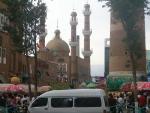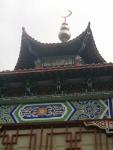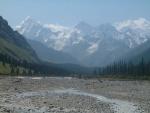- Getting around Lijiang. Dont stay in the Old Towns more than 2 days, there is nothing to do. KRISS Oct 9, 2013 05:46
- 2013 Beijing Temple Fair BENNYLAU Feb 26, 2013 03:29
- Malaysian traveling from KUL - LAX vis Shanghai PVG ZATI_DY Jan 3, 2013 20:15
<a>Xinjiang: Invading the Wild Northwest
- Views: 4839
- |Vote: 1 0
- |Add to Favorites
- |Recommend to Friends
Urumqi
After two weeks of teaching English in Jinghong, Yunnan province, I boarded a China Southern flight eventually headed to Urumqi, the capital city of northwest China’s Xinjiang province. Looking around, I knew many of these people weren’t Chinese, at least not in the way westerners perceive them.
Two rows in front of me there was a man with a floral print shirt and a wide-brimmed hat whom I swore I’d seen on a trip to Panama last spring. He spoke good Mandarin, but there was something strange about hearing the Chinese language coming from someone who looked more Latin-American than Asian.
As I searched further, I realized that more like him were interspersed throughout the Han Chinese. With dark skin and non-slanted eyes, they looked almost Middle Eastern. Forget provincial borders, this was like flying to another country.
I soon realized that I was sitting among Uyghurs, members of an ethnic minority in China with a population of close to nine million people. Uyghurs are a Muslim Turkic people, and their language and culture reflect the fact that they’re not ethnically Chinese.
During China’s last dynasty, the Qing, China finally gained complete control of the giant landmass home to the Uyghurs. It was called Xinjiang, or "new frontier," reflecting an imperial bias and signifying the desire to harness the land’s vast economic potential. Uyghurs, who had abandoned their nomadic lifestyle and settled here, sometimes refer to their homeland as Eastern Turkestan. The controversial moniker reflects tensions between some Uyghurs who seek independence and a Chinese government who won’t tolerate any talk of secession.
A brief, unscheduled stop in the world’s most populous city, the sprawling Chongqing, set us back an hour, but soon we were descending over the rugged mountains of the Tian Shan range, enjoying the fact that we were seeing snow-capped peaks in July.
A cab from the airport into Urumqi cost us 80 yuan, and we kicked ourselves for not having negotiated the price before we arrived. There was no meter running, so we had to pay the guy whatever he asked (within reason, of course).
Having traveled for 11 hours that day, my friend Brad and I weren’t in the mood for any more tourism, even though it was still light outside at about 10 p.m. Interestingly, all of China employs Beijing time for most official purposes. But doing so in Xinjiang would be like basing time in Nevada or Colorado on Eastern Standard Time, which would have workers in the region starting their jobs long before the sun rises. The solar system doesn’t cooperate with Beijing’s whims, so people in Xinjiang set the clocks back two hours for practical purposes like store hours and personal meetings. When making plans, specifying Beijing or Xinjiang time is a must.
The next morning we got our first real taste of Xinjiang. Urumqi is a big city by American standards, but with a population of about 2 million, it’s not large at all, especially for a capital. We walked to the Bank of China under the shade of skyscrapers, enjoying the cool breeze that stirred up the dry desert air. We definitely weren’t in humid Yunnan anymore.
After talking to Zach, a friend who had been there a few days, I realized that Urumqi was not just a Uyghur wonderland. Han influence is growing in this Uyghur Automous Region, but Urumqi (“Wulumuqi” in Mandarin) boasts a diversity that can be expected of a border province that has served as a cultural crossroads throughout history.
Some signs boast Chinese, Arabic script, Russian and English, and turning a corner in Urumqi can land you in an entirely different culture. The Uyghur part of town is dominated by the pointed arches and domes typical of Islamic architecture. Minarets, towers at mosques from which Muslims are called to prayer, overlook Middle Eastern-style shopping plazas. Squeezing through the crowds to the KFC, we passed a double-humped camel and women wearing flowing garments and colorful headscarves.
In the city’s Russian corridor, after escaping the money changers near the Russian market, we saw blond-haired Caucasian women in western clothes rushing for the hundreds of shoe shops nearby. Some of them were tourists, for sure, but many of them hailed from the Motherland. Earlier in the week, Zach had met a red-headed Russian lady who owned a restaurant but couldn’t speak Chinese at all.
Back on a Chinese street, we grabbed a taxi to the airport. Urumqi, the world’s farthest city away from an ocean, had given us a fresh taste of Xinjiang. We were off to see if this city was an anomaly, or if the rest of the province was just as spicy as its capital.
Ili, Yining, or Ghulja?
This city, located across the province from Urumqi near the Kazakh border, has three names, so when making travel arrangements, we had to make sure to know which language was in play.
Our flight from Urumqi took about an hour and landed us at an airport that was primitive even by Chinese standards. We walked on the tarmac from the plane to the inside, and the baggage pickup was nothing more than a few workers tossing bags over a counter. Curiously, as far as we were away from Beijing, there was still an English sign above the counter that read, “Baggage Claim.”
Our first hotel was down the street from a university called Yili Shi Fan Da Xue. When we walked in, the attendant asked if we were Kazakh people. We decided to be honest and told her no, we were Americans. This was apparently the wrong answer. This hotel was not fitted for overseas guests. As we found out later, this region is highly regulated, and the government specifies which hotels can house foreigners. This allows the government to more efficiently track potential spies like us.
We found a hotel down the street that was willing to accept us, but they told us we could only have two nights now, and one night when we came back through. A gold sign underneath the international clocks behind the desk read: “Fixed hotel for overseas visitors.” So we set up camp.
With our bags stored, we ventured across the street to a Hui noodle shop. The Hui are a people group considered a Muslim minority, but they speak Chinese and differ from the Han Chinese mostly just in the fact that they adhere to Islam. Their restaurants are everywhere in Xinjiang, and you can find them by following the men in white skull caps. The Hui specialize in rice noodles, and out of both necessity and a desire to stay kosher, they usually opt for a spicy combination of sheep meat and vegetables, which we ate for our first true meal in Xinjiang.
Our second meal consisted mostly of fried jiaozi, Chinese dumplings filled with ground yang rou (sheep meat). For one yuan a piece we added sheep kebabs cooked on an open grill outside the restaurant. We later learned that both kebab and pilaf are words that originated in Uyghur language. The meat was a little fatty, but it had an amazing peppery flavor. To offset the fiery meat dishes, we ordered a few plates of chilled cucumbers.
The best part about Ili (or Yining), though, wasn’t the dinner. It was the dessert. An hour after our hearty supper, we found ourselves sitting at an ice cream parlor run by Uzbeks. We ordered the sweet cream, and found that it had an unrivaled thickness and flavor that must get filtered out by the pasteurization process in America. Topped with a heavenly raspberry glaze, this dish blew Baskin Robbins away. Before leaving the next day, after eating lunch at an out-of-the-way Kazakh restaurant, we came back for seconds.
On the way back to the hotel one night, we passed a large park that took up an entire city block. It was near sundown, and people of varying ethnicities had come out to enjoy the cool dusk. On the corner stood a sort of gazebo, colored with gold, red, blue and green paint and built in the traditional Chinese, imperial-style architecture. We had seen a number of these throughout China. But this one had one attribute that set it apart: Against the graying sky, we saw the Islamic crescent moon extending from the structure’s apex. This strange assimilation became, to me, a symbol of Xinjiang’s diversity.
Forbidden Beauty in Zhaosu County
Zhaosu, the county seat of Zhaosu County, is a small city about a three-hour taxi ride away from Ili. With some savvy negotiating, we landed a xiao che (small car) for about 200 yuan. We had met a man in Urumqi who told gave us the name and cell phone number of a Mongolian in Zhaosu County who could serve as a host and travel guide for us.
Zhaosu is already close to Kazakhstan, but our guide lived in an even smaller town within a day’s hike of China’s Central Asian neighbor. A river, milky with white minerals carried down from the mountains, ran next to the town and provided both its Mongol name (“White Water”) and a small measure of hydroelectricity. Outside our guide’s front window, above the mudbrick homes surrounding his, snowy peaks towered as if beckoning for us to explore. So our second day there, we hiked 12 miles into the mountain meadows and drank in the natural beauty—and a little bit of the white water.
After the hiking day, our guide took us to a natural hot spring popular among Chinese tourists. To get there, our hired 4x4 crawled over treacherous mountain roads where one slip could have sent us tumbling into the tall, pointy conifers that lined the river below. We crossed a few log bridges and a few times our Uyghur driver had to scare the sheep out of our path.
When we arrived, we realized that the view was worth the risky trip. The resort (if you affix this label to this hodgepodge of dwellings) sits in a green valley next to another rushing river. From the riverbank we could see the opposite side of the icy mountains we’d seen at our guide’s home. From here, they looked taller, wider and even more majestic.
We shook hands with the Han Chinese owner of the place, and he offered us a variety of housing options. Thinking it would make for the best stories, we chose a yurt, a low-budget replica of the traditional homes of Mongol and Kazakh people.
The next day was perfect, with the sun high in the sky and clouds moving away to give us an unobstructed view of the mountains. We spent the day hiking and horseback riding, which we thoroughly enjoyed. But in order to see more of Xinjiang, we decided to head back to our guide’s down. From there we’d hit the road back to Ili and do some city hopping before returning to Urumqi. Little did we know, the authorities were about to accelerate the process.
When we arrived back in our guide’s town, we were summoned to the police station. Apparently, he was supposed to register us with the government, but he hadn’t. The Kazakh officer who confronted us told us that we could not be there because there was no place approved for foreigners to stay. Who knows how mad he would’ve gotten if he had known we stayed at our guide’s home.
For us, this was perplexing. The hot spring folks had no problem accepting our business, and another town’s government official had checked our passports and allowed us to stay. But nonetheless, we were deported back to Zhaosu, where we were allowed to spend one night before we would be required to go back to Ili, a day ahead of our reservation in the approved hotel.
City-hopping
We had no reason to stay in Ili, so we decided to get out of town before we wore out our welcome. From Ili we traveled to Bole, then over the next few days up to Wenquan, back to Bole, to Jinghe, over to Wusu, and from there back to Urumqi. Within those few days, we had over six encounters with different police officers, most of whom were nice people, just doing their job to make sure that their region remained spy-free. Depending on how the political situation plays out, we may be the first and last Americans ever to have seen the view from the hot springs resort.
Moral of the story? Travel to Xinjiang to enjoy the rich cultural diversity and staggering natural beauty, but be aware that if you’re a foreigner, immersing yourself too deeply (going to destinations off the beaten path) can cause some inconvenience. If accosted by the police, play dumb, and you’ll usually be let go without incident.







 Copyright © 1998-2026 All rights reserved.
Copyright © 1998-2026 All rights reserved.
1.
Nov 1, 2006 23:53 Reply
CHYNAGYRL said:
What an interesting place to visit. Your article really stirred my appetite to visit Xinjiang. It was certainly on my list before, but now I am even more interested in visiting. Keep up the good writing!